Zac O'Yeah in The Hindu
Arundhati Roy opens her door and lets me in – into her kitchen. I wonder if I’ve knocked on the wrong door: the delivery entrance, perhaps? I quickly hand over the humble gift of fresh coffee beans I’ve brought her, on the assumption that all serious writers love coffee.
As we sit down around her solid wood kitchen table surrounded by funky chairs, I realize that the kitchen is the warm heart of her self-designed apartment in central New Delhi. Apart from long work counters, there’s a sofa, a bookshelf, a sit-out terrace with an antique-looking bench – altogether a place where one could spend a lifetime.
But right now she’s all over the world and is somewhat jet-lagged after having just flown in from New York. Following a bunch of interviews in town, she’s soon off again on a worldwide promotion tour for her new novel. The Ministry of Utmost Happiness is her first in two decades since the globally bestselling, Booker Prize-winning, The God of Small Things. It appears to be the literary happening of the decade and according to her publishers ‘it reinvents what a novel can do and can be’. I’ve started reading it and can say that it is a ruthlessly probing and wide-ranging narrative on contemporary India, written with a linguistic felicity that reminds me of Salman Rushdie’s classic Midnight’s Children. On the whole, it makes interviewing her an intimidating prospect. While she makes coffee, I rig up my electronic defences consisting of three audio recorders (two of which conk out during the interview) and a backup video camera. She looks on bemusedly and seems used to a barrage of microphones. We embark on a three-hour interview session. Excerpts:
Generations of new Indian writers have seen you as an inspiration, as someone who allowed them to dream that one could sit in India and write and then be read all over the world. How does your iconic status feel to you? Do you ever think about it?
Not really, because I am equally balanced by the kind of rage and craziness that I evoke. For me, I live inside my work. Although I must say that I was thinking at some time about writers who like to remain anonymous – but I’ve never been that person. Because, in this country it is important, especially as a woman, to say: “Hey! Here I am! I am going to take you on! And this is what I think and I’m not going to hide.” So if I have helped to give courage to anybody… to experiment… to step out of line… That’s lovely, I think it is very important for us to say: “We can! And we will! And don’t f*** with us!” You know, come on.
I’ve noticed that you don’t often appear at literary festivals. There are more than a hundred in India these days, and I’ve been to quite a few myself, but never met you before. Do you keep away from other writers?
It’s not about other writers. I don’t know if you’ve read this essay I wrote called Capitalism – A Ghost Story and Walking with the Comrades? The thing is that the Jaipur Literature Festival is funded by a kind of notorious mining company that is silencing the voices of the Adivasis, kicking them out of their homes, and now it is also funded by Zee TV which is half the time baying for my blood. So in principle I won’t go. How can I? I’m writing against them. I mean, it’s not that I’m a pure person, like all of us I have contradictions and issues, I’m not like Gandhiji, you know, but in theory I abide by this. How can you be silencing and snuffing out the voices of the poorest people in the world, and then become this glittering platform for free speech and flying writers all around the place? I have a problem with that.
Do you read a lot of new Indian fiction or non-fiction?
When I’ve been writing this book, I haven’t been very up on current things. I’m not even on Facebook and all that. I don’t have any problem [with it], but as Edward Snowden told me, the CIA celebrated when Facebook was started, because they just got all the information without having to collect it. That aside, I think that when you’re writing, you tend to be a bit strange about reading: sometimes I’m not reading whole books, I’m dipping into things to check my own sanity. ’ (She waves her left hand in a kind of elegantly psychedelic mudra before her face.) ‘Am I on the same planet?
Is there any particular Indian writer who you admire?
I think that Naipaul is a very accomplished writer, although we are worlds apart in our worldviews. But I’m not really that influenced by anybody, you know. I have to say that I find it incredible that writers in India, or almost all Indian writers, or at least the well-known writers… Let’s not say writers, but there’s been a level of eliding of things that have been at the heart of the society, like caste. You see there is something very wrong here. It is like people in apartheid South Africa writing without mentioning that there is apartheid.
Your writing is hard-hitting and outspoken – have you experienced any adverse repercussions?
My God, that’s to put it mildly. Other than of course going to jail and all that. Even now, when the last book of essays was released in Delhi, called Broken Republic, a gang of vigilantes came on stage, smashed the stage up. The right wing, the mobs, vigilantes, they are there at every meeting, threatening violence, threatening all kinds of things. I still go to speak, to Punjab, in Orissa, wherever, I’m not really that writer who is sequestered somewhere and I live perhaps alone, but in the heart of the crowd.
It must have been a bit of a shock, after expressing a personal opinion, to suddenly find yourself behind bars in Tihar Jail?
Tihar. (She sighs deeply.) Yes, it is shocking, but at the same time look at how many thousands of people are behind bars, people who have no understanding of the language, who don’t even know what they’re charged with. So I can’t really be dramatic about what happened to me, because people are in jail for years for nothing – nothing! It’s crazy! I’m currently being tried for contempt of court again for an essay I wrote called Professor P.O.W. which you can read in Outlook Magazine.
Have you ever felt that you should leave India and live in a country where you don’t have to face such problems?
Everything that I know is here! Everyone that I know! And I’ve never really lived outside, abroad, so the idea of going to live all alone in some strange country is also terrifying. But right now I think India is poised in an extremely dangerous place, I don’t know what is going to happen to anybody – to me or to anybody. There are just these mobs that decide who should be killed, who should be shot, who should be lynched, you know? I think it is probably the first time that people in India, writers and other people, are facing the kind of trauma that people have faced in Chile and Latin America. There’s a kind of terror building up here which we have not fully got the measure of. You go through periods when you are feeling very worried, then angry, and then defiant. I think this story is still unfolding.
Do you anticipate upsetting people with the new book? Though the mobs don’t read anything sophisticated, do they?
It’s never about the book or what they read or don’t read, it is about some arbitrary rules they have made about what can be said, what can’t be said, who can say what, who can kill whom – all of that. Yeah, I mean I live here, and I write here, and this book is about here. But the situation here is out of control, from the bottom! It is not about just getting killed, but it is about: How do you even sit in a train or a bus now if you are a Muslim without risking your life? So what happens with me, I have no idea. I’ve written a book and it’s taken me ten years to write it, and there are thirty countries in the world where the biggest publishers are publishing it. I’m not going to allow some idiots to come and disrupt it and snatch all the headlines. Why should I? It is not about their little brains, it is about literature. It has to be protected and tactically done in this climate.
Let’s talk about the book. What was it that made you publish a new novel after spending twenty years being a public intellectual?
Well, this novel has been ten years in the writing, but I think in the twenty years between The God of Small Things and now, I have travelled and been involved with so many things that are happening and written about them at length. There was this huge sense of urgency when I was writing the political essays, each time you wanted to blow a space open, on any issue. But fiction takes its time and is layered. The insanity of what is going on in a place like Kashmir: how do you describe the terror in the air there? It is not just a human rights report about how many people have been killed and where. How do you describe the psychosis of what is going on? Except through fiction.
So that is why you chose…
But it is not that. I didn’t choose to write fiction because I wanted to say something about Kashmir, but fiction chooses you. I don’t think it is that simple that I had some information to impart and therefore I wanted to write a book. Not at all. It is a way of seeing. A way of thinking, it is a prayer, it is a song.
In the book you use a remarkably poetic language to talk about the harshest subjects.
Language is something so natural to you, you know, not something you can manufacture, not for me.
Having studied architecture, you must have at some point thought of that as your field, while today you are one of the most celebrated novelists on the planet. What does your interest in language stem from?
Actually, the idea of language was far before architecture, because in a way architecture came to me as a very pragmatic thing. I left home when I was seventeen and I needed somehow to…
(At this point one of her dogs climbs all over me. I’m more accustomed to dogs barking the moment they see me but, puzzlingly, this one appears to want to lick my face. Arundhati laughs.)
She’s flirting with you. They are both street dogs. She was born outside a drain. Then her mother was hit by a car. That other one I found tied to a lamppost, cruelly.
Do your dogs have names?
Yeah, her name is Begum Filthy Jaan and this one is Maati K. Lal. That means “beloved of the earth”. Both Lal and Jaan mean beloved.
So they make up your family?
Yes.
They’re very well behaved to be street dogs.
Street dogs are more civilized than other dogs. They’re the best. I’m also a bit of a street dog.
I see. So we were talking about your relationship with language and how you left home at 17.
The relationship with language was there from the time I was very, very young. The only thing is that it didn’t seem possible that I would ever be in a position to be a writer.
Why not?
No money… How are you going to earn a living? In the early years of my life my only ambition was to survive somehow, pay my rent. So it didn’t seem like there’d ever be that time where you could actually sit and write something but you’d be so busy earning. It was just a question of: How do you survive?
How did you survive then?
I used to work in this place called the National Institute of Urban Affairs where I earned almost nothing. I used to live in this little hole-in-the-wall near the Nizamuddin Dargah and hire a bicycle for one rupee a day to go to work. All my time I spent thinking about money. (She giggles.)
So at that point you were almost about to become a bureaucrat?
No, no, architect! I could never have become a bureaucrat.
But a government servant?
No, not even that. I was just a temporary, you know at the edges of it.
So then the writing really started with the film scripts?
Basically after Annie [In Which Annie Gives It Those Ones (1989)] – a film that just made its own secret little pathways into the world away from the big hit films – I wrote a second film called Electric Moon and then The God of Small Things. And after that, the essays.
And now you’re making a fiction comeback. Was there any particular idea or incident that triggered off the new book? It seems to be a meditation on the state of the nation.
(She takes a large sip of coffee and rubs her eyes.) ‘It’s a meditation, let’s say, just a meditation. Always, some things spark something and I think in my case I don’t think what sparks it is necessarily what it’s about. Obviously so many years of one’s life and thinking and encounters and all that… but I think one of those nights that I used to spend in front of Jantar Mantar with all these [protesters] who come there, a baby did appear and people were asking: “What to do?” Nobody was sure what to do. So that was one of the things.
I recall that sequence in the novel, and you also narrate many of the individual stories behind the characters you meet at Jantar Mantar?
That was one of the ideas for me that I would – experiment. As you can imagine with any writer who writes a “successful” book, then everybody wants to sign contracts and give you lots of money… and I didn’t want that. I wanted to experiment. I wanted to write a book in which I don’t walk past anyone, even the smallest child, or woman, but sit down, smoke a cigarette, have a chat. It is not a story with a beginning, middle and an end, as much as a map of a city or a building. Or like the structure of a classical raga, where you have these notes and you keep exploring them from different angles, in different ways, different ups, different downs.
About the first hundred pages of the book are set in Old Delhi. What is your relationship to that part of town?
I actually have a place there.
Near Jama Masjid?
Yes, a rented place, a small room, so I’ve been there for many years.
But why do you need that place when you have this apartment?
You sometimes feel under siege. It was not that I went there because I was going to write about it, but because I went there it became very much part [of the book]. I go there, wander around late at night.
All those rabid street dogs, they don’t chase you?
No. Not at all. Humans are rabid, dogs are okay.
The title is intriguing – The Ministry of Utmost Happiness – because inside the book there’s quite a lot of darkness.
But yeah, there’s also quite a lot of light. And the light is in the most unexpected places.
There’s also a character called Tilo, who seems to me very much like Radha in In Which Annie Gives It Those Ones. Is she a continuation of that character?
(She laughs.) She’s not actually like Radha when you carry on [reading]. Yeah, she’s in architecture school, but I think Tilo is a very different person actually.
But how much autobiographical detail do you use in your writing?
It is hard to say, because where does your imagination end and your experience begin? Your memories? It is all a soup. Like in The God of Small Things when Esthappen says, “If in a dream you’ve eaten fish, does it mean you’ve eaten fish?” Or if you’re happy in a dream, does it count? To me this book is not a thinly veiled political essay masquerading as a novel, it is a novel. And in novels, everything gets processed and sweated out on your skin, has to become part of your DNA and it is as complicated as anything that lives inside your body.
On that note, let me ask: in the years you worked on the novel, did you get tired of it at some point or were you happily engrossed in it for an entire decade?
When I write fiction I have a very easy relationship with it in the sense that I’m not in a hurry. Partly, I really want to see if it will live with me, you know, for long. If I got fed up with it, I would leave it and imagine the world would get fed up too. I need to develop a relationship with it almost like…(She goes quiet.)
Like with another human perhaps?
Or a group of humans. We all live together.
Nerdy question time – are there any rituals you have to go through like putting on a jazz record or uncorking a bottle of Old Monk before you start writing?
Let’s say when I was breaking the stones and really trying to understand what I was trying to do I would never be able to work for very long, just a few hours a day. There were two phases in writing this book, one was about generating the smoke, and then it’s like sculpting it, none of which is the same as writing and rewriting, or making drafts. But when you’re generating the smoke, it would be like – I could write three sentences and then just fall asleep out of exhaustion. But when the book was finally clear to me, I’d be working long hours. It was the same with The God of Small Things, there would be that single sentence which would send me to sleep. Like a strange trance almost.
Has your training as an architect been helpful to you?
Not just helped, it is central to the way I write.
How?
Because to me a story is like the map of a city or a map of a building, structured: the way you tell it, the way you enter it, exit it… None of it is simple, straightforward, time and chronology is like building material, so yeah, architecture to me is absolutely central.
I recall Vikram Chandra once telling me how he adapted a construction project management software, used by architects and builders to control the supply chains and all that, to plan and track all the elements in his novel Sacred Games. Do you – as an architect – plan your writing like that?
Oh God! There’s no algorithm involved in my writing, it is all instinctive… rhythm.
What’s a good writing day like then? You get up at five o’clock and take strong coffee or do you wake at three in the afternoon and pour yourself a glass of champagne before hitting the desk?
I don’t seem to have any rituals as such, it is just a very open encounter between me and myself and my writing. I don’t actually understand what we mean by “when you write” because I kind of wonder when am I not writing? I am always writing inside my head! But right now, I feel almost like if I weighed myself, I’d be half my weight, because the last ten years it’s just been in my head, all the time! At least now’ (she points at the book on the kitchen table) ‘it is with me, but it is not on the weighing scale. You know?
What do you do for inspiration?
You know, one of the reasons it would be so hard for me to leave this country, is that everywhere I turn there is something so deep going on. That way I’m lucky in terms of the worlds that I move through here whether it is in the Narmada Valley or in Kashmir. It is a very anarchic, unformatted world that I live in. To me, if anything it is an overload of every kind of stimulus. I suppose I’m not closed off in some family thing. There’s a porous border between me and the world and lots of things come and go. That’s the way I live. There are so many brilliant people doing things around me all the time, like even just in the process of making this book – if I want someone who is an insane … who’s actually not a human being, but a printing machine, I lean this way. If I want someone who is skulking around the city taking pictures, I lean that way. One is just surrounded by unorthodox brilliance all the time. And that’s my real inspiration. If I want really badly behaved dogs I have them too.(She laughs and hugs one of her dogs who is barking in the background, presumably impatient with our interviewing.)
Between writing fiction and non-fiction – which one gives you more pleasure or are they equally satisfactory?
No, there’s no comparison between them for me. Non-fiction is not about pleasure; non-fiction has a sort of urgency to it and another kind of intensity. But fiction is about pleasure. I know for some people it is very painful, but for me not.
What do you do then when you celebrate a good writing day or a well done story? Do you open a bottle of Old Monk?
(She bursts out laughing.)
You’re just stuck on your Old Monk! No, I… I think I just float around.


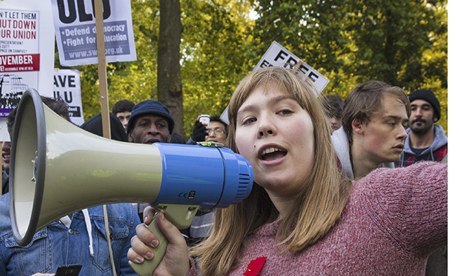
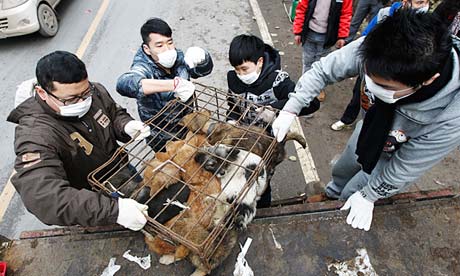
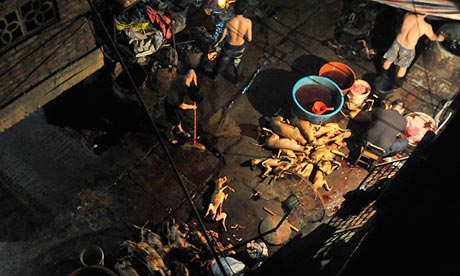
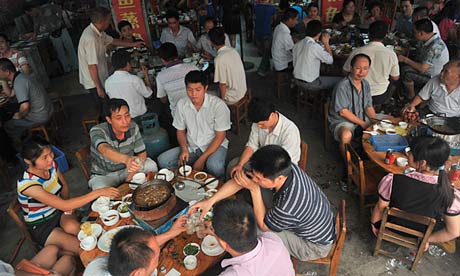
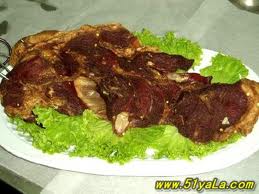 All animals that are grown for meat are raised, trucked and killed with
extreme cruelty. But man has taken unkindness to an art form. Let me
give you a list of the cruelest foods. I am sure I can give you at least
100, but let me start with ten.
All animals that are grown for meat are raised, trucked and killed with
extreme cruelty. But man has taken unkindness to an art form. Let me
give you a list of the cruelest foods. I am sure I can give you at least
100, but let me start with ten.